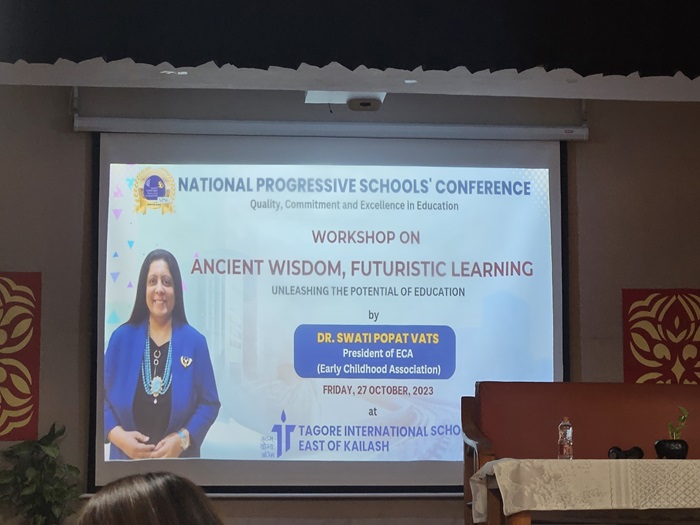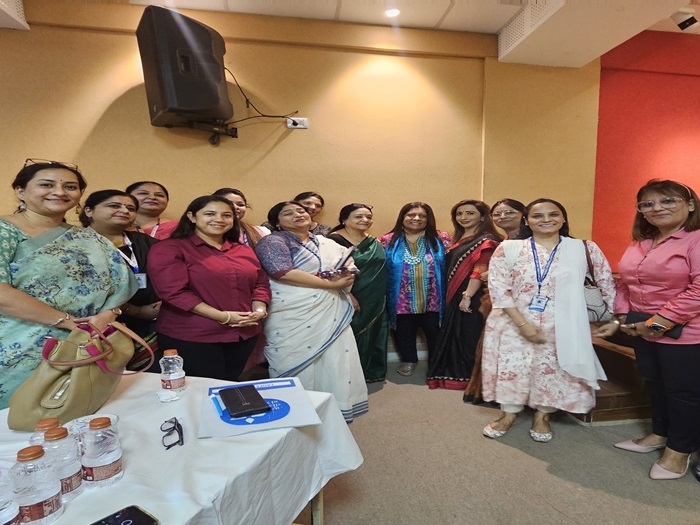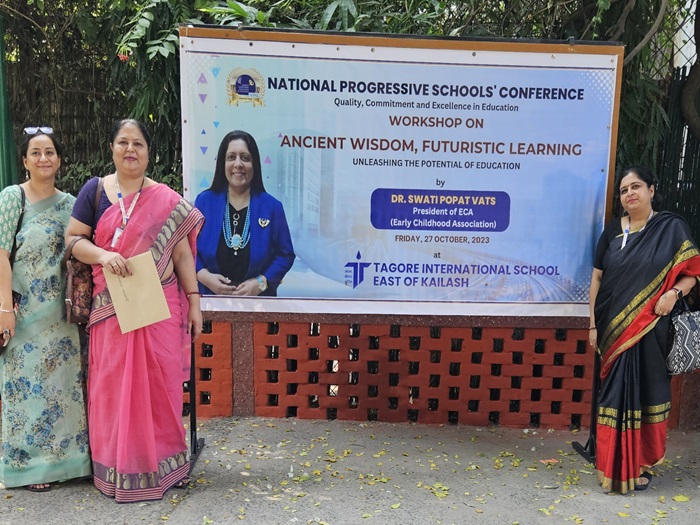Teacher workshop on application of Ancient Wisdom with Futuristic Development
On October 27, 2023, the National Progressive Schools’ Conference hosted a workshop on ‘Ancient Wisdom, Futuristic Development: Unleashing the Potential of Education’, at The Tagore International School, East of Kailash. The Indian School was represented by Ms Sandhya Batheja, Ms Shikha Sharma and Ms Aarushi Rawat.
The resource person at the workshop was Dr Swati Popat Vats, global educator, with over 32 years of experience, Ms Popat is President of the Early Childhood Association of India. She recently set up the world’s first video-based parenting website ‘Born Smart’ which helps parents understand the importance of brain development in the first 1,000 days of the child’s life (birth to 3 years). Dr Popat has authored several books for parents, teachers, and children, and regularly blogs and tweets about childhood, parenting and child rights.
The main objective of this workshop was to provide an overview of the rapidly expanding science of mindfulness and its applications. It implied that we can draw on the reservoir of knowledge that our forefathers have left us and apply it to modern pedagogy to equip the next generation of citizens with critical thinking skills, knowledge, and abilities.
Ms Popat’s message set the tone of the workshop, where she talked about education being holistic in nature, a system that provides active learning and does not make monoclonal kids. Students can study a variety of subjects, identify their interests, and gain competence in subjects that interest them by using the abundance of knowledge that education delivers. It produces problem-solving and inventiveness by giving learners practical skills. The New Education Policy is aimed at achieving these learning goals.
The nature of education and our understanding of child psychology are improved on, by drawing on the mutuality and dialogue between ancient teaching and contemporary psychology. Above all, the traditional Vedic teachings of the PANCHKOSH and PANCHADI have been woven into the New Education Policy.
The National Curriculum Framework for the foundation stage education of the 3-8 years’ age group, focuses on the ‘panchakosha’ concept – the ancient Indian emphasis on the body-mind connection. The NCF says its five parts are physical development (sharirik vikas), development of life energy (pranik vikas), emotional and mental development (manasik vikas), intellectual development (bauddhik vikas) and spiritual development (chaitsik vikas).
The five-step learning process – ‘Panchaadi’ is recommended as a good way for a teacher to formulate the lesson plan – the sequence of activities and approaches that should be used to teach a child.
- Aditi (Introduction): As a first step, the teacher introduces a new concept/topic by establishing a connection with the child’s prior knowledge. Children gather relevant information regarding the new topic with the help of the teacher by asking questions, exploring, and experimenting with ideas and material.
- Bodh (Conceptual Understanding): Children try to understand core concepts through play, enquiry, experiments, discussion, or reading in the second step. The teacher observes the process and guides the children. The teaching plan has a list of concepts to be learnt by the children.
- Abhyas (Practice): The third step is about practice to strengthen understanding and skills through a range of interesting activities. Teachers can organise group work or small projects to reinforce conceptual understanding and attainment of competencies.
- Prayog (Application): The fourth step is about applying the acquired understanding in the child’s everyday life. This can be accomplished through various activities and small projects.
- Prasar (Expansion): The fifth step is about spreading the acquired understanding through conversations with friends, telling each other new stories, singing new songs, reading new books together and playing new games with each other. For each and every new topic learnt, a neural pathway is created in the brain. Sharing knowledge strengthens our learning. A neural pathway is incomplete if we don’t teach what we have learnt. Teaching makes learning clear and long-lasting.
Hundreds of years before the term “holistic development” became fashionable in contemporary education, the speakers’ ideas and points of view demonstrated that there is much to be learned from the ancient Indian Vedic education system, which placed a strong emphasis on lifelong learning. This includes education that promotes growth on all levels-mental, cognitive, physical, and spiritual.















